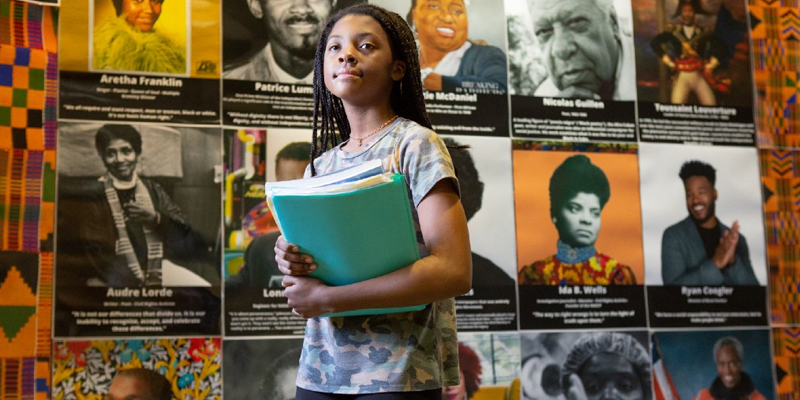Posted by Nellie Mae Ed. Fdn. Photo by Allison Shelley for EDUimages
When our organization sat down to write an end-of-year reflection in December of 2020, I felt a flicker of light and hope to shine in the distance. After one of the most challenging years for many of us, 2021 promised a light: a return to in-person school activities, vaccines, and new leadership in the White House. But we know that things usually don’t go as we hope or imagine.
2021 ended up being full of its own challenges and hardships, including the attacks on democracy we saw across our nation — from the storming of the capital at the beginning of the year, to attacks on public education and the teaching of the true history of our country.
We know that pushback is often a response to change, progress, and movement. Back in June 2021, Professor Kimberlé Crenshaw reminded us of the importance of historicizing these kinds of attacks to remember that we’ve seen similar trends before because “the control of the frame, the control of the ability to communicate, the control over knowledge about racial oppression has always been one of the go-to features of those who want to sustain and maintain an inequitable status quo.” And, this knowledge coupled with the tools and opportunities before us and the incredible work of so many continuously fill me with hope, expectation, and joy.
Hope because organizations like the Equity Institute in Rhode Island are working diligently to create culturally affirming spaces to attract and retain educators of color, and have led efforts in their state to create pipelines and pathways for these educators –beginning with professionals that have already dedicated their lives to working in schools.
Hope because in places like Chelsea, Massachusetts, our Speakers Bureau member and grantee partner Gladys Vega of La Colaborativa has not only partnered with Chelsea Public Schools to advocate for better opportunities and services for families and young people, she has also worked to build a pipeline for Latina leaders in municipal city leadership, where they can play key leadership roles in their school systems and communities.
Hope because advocacy from youth organizers in Connecticut led to the passage of legislation requiring that every public high school in the state offer an elective in Black and Latinx history, which will start being implemented next year.
Hope because Gedakina, an Indigenous-led and serving organization in Vermont, has been leading virtual workshops focused on culturally relevant and historically accurate curriculum, and providing culturally appropriate and historically accurate literature on Indigenous communities through its One Shelf Project.
And hope because of countless other organizations, schools, educators, families, organizers, and young people working for change and racial equity in public education in communities across New England. We are so grateful for and inspired by all of you.
We know 2022 will have its own set of challenges and opportunities, but it is because of our partners that are working to advance educational equity every day that we have hope and are reminded of what love and justice look like in action. We end the year with profound gratitude and in deep contemplation as we consider the immense wisdom and teachings of the great now ancestor bell hooks: “there can be no love without justice,” and “the heart of justice is truthtelling.” We look forward to a season of rest and restoration. We look forward to a new year filled with hope, love, truthtelling, justice, and joy.
In community and solidarity,
Gislaine N. Ngounou
Interim President & CEO
Nellie Mae Education Foundation
Take a Look Back at Our Most Popular Posts of 2021:
Open Letter: Teach Us Everything
The Nellie Mae Education Foundation Appoints Dr. Gislaine N. Ngounou as Interim President & CEO
A Letter from Our Youth Advisors
Announcing Our 2021 Speakers Bureau
When White Tears Are Held In Higher Regard Than Black Life

